How to Turn on AutoSave in Excel 2007-2019 (An Easy Guide)
What Is AutoSave in Excel
AutoSave is a feature available in Microsoft Excel, Word, PowerPoint, and Office 365 that can save your files automatically at a certain interval when you are working.
In Microsoft Office, you can use the AutoSave (namely AutoRecover) tool to temporarily keep changes in a directory on your local computer. You can change the Autosave location flexibly. In Microsoft 365, AutoSave is enabled by default when a file is stored on OneDrive, OneDrive for Business, or SharePoint Online.
With AutoSave enabled, Excel will keep your file when an expected problem occurs such as a program crash, sudden power cut-off, or system corruption, which will ensure minimal data loss. Now, let's check how to enable AutoSave in Excel on Mac and Windows 10.
How to Turn on AutoSave in Excel 2019/2016/2013/2010/2007
In this part, we will show you how to turn on AutoSave in Office Excel on Mac and Windows computers. Besides, steps to enable AutoSave in Office 365 are also explained.
Turn on AutoSave in Excel Mac
macOS crash and power failure occur accidentally. If you are working hard on a crucial Excel but don't save it when Excel stops working, the AutoSave would be helpful. Follow to see how to turn on AutoSave in Excel on Mac.
Step 1. Open Excel on your Mac. Click Excel in the top toolbar and click "Preferences".
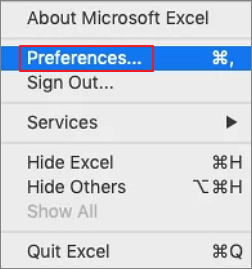
Step 2. In the Excel Preferences box, click "Save" under Sharing and Privacy.
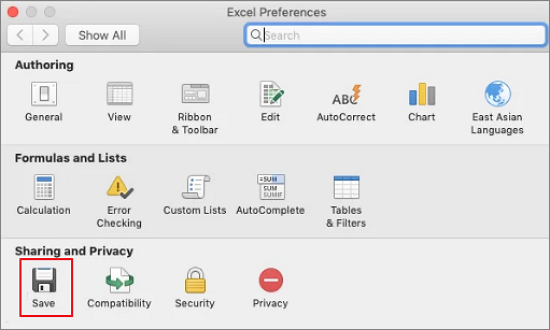
Step 3. Select "Turn on AutoSave by default" and "Save AutoRecover info every xx minutes". Then, click "OK". That's it.

Turn on AutoSave in Excel Windows 10
It's simple to enable the AutoSave feature in Excel on Windows 10/8/7. Here are the steps.
Step 1. Open Excel on your computer. Go to "File" > "Options".
Step 2. Click Save on the left panel. Select "Save AutoRecover information every xx minutes" and "Keep the last autosaved version if I close without saving" by ticking the boxes ahead. Click "OK" to save the changes.
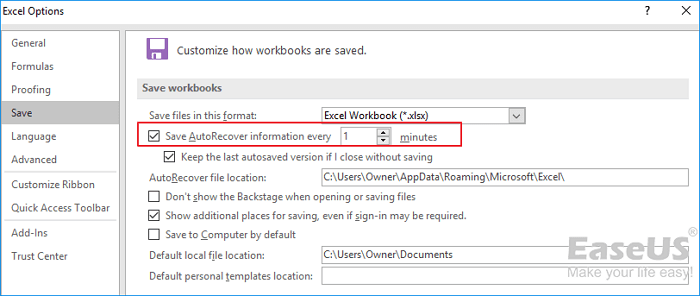
Turn on AutoSave in Excel Office 365
If the AutoSave doesn't work in Excel of Office 365, turn it on and change the settings with the ways below.
Step 1. Start Excel, click "File" > "Options".
Step 2. In the Options dialog box, click on the "Save" button. Check the Option of "AutoSave OneDrive and SharePoint Online files by default in Excel". Then, your Excel work will be saved in real-time.
Step 3. Select "Save AutoRecover information every xx minutes". We recommend that you keep the auto-save interval as short as possible. Then, click "OK" to keep the change.

These are the quick methods to turn on AutoSave in Microsoft Office and Office 365. You may have noticed that we mentioned AutoSave and AutoRecover What's the difference between them?
Excel AutoSave and AutoRecover
In simple words, AutoSave is a new feature in Excel Office 365, while AutoRecover is the name of the auto-save feature in prior versions, Excel 2010/2013/2016/2019.
AutoSave is turned on by default in Microsoft 365. AutoRecover does exactly the same thing as AutoSave and keeps changes in your Work on your local computer. Once you encounter a data loss without saving, you can recover the unsaved Excel from temporary files. You can retrieve Excel from the last AutoRecovered version.
Excel AutoRecover helps you retrieve unsaved files after an accidental closure or crash. It allows you to restore to the last saved version which displays in the Document Recovery pane when you start Excel next time.
How to Restore Unsaved Excel Files Using AutoRecover
If you lose your Excel work after a fortuitous closure or crash, you can recover unsaved Excel files by using the AutoRecover features in 2 Ways.
1. Recover Unsaved Excel in the Document Recovery
Excel AutoRecover allows you to restore from the last saved version that appears in the Document Recovery pane when you re-start Excel.
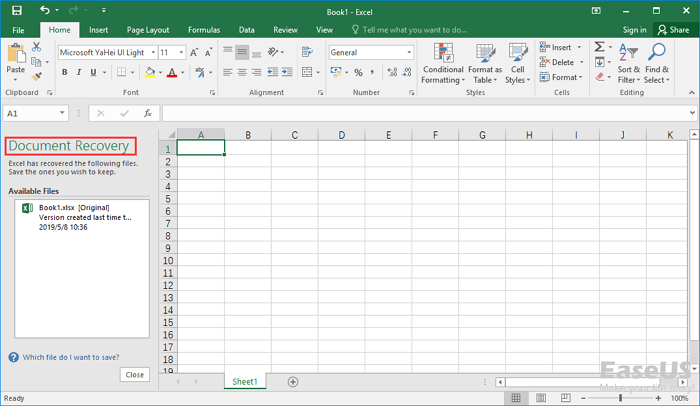
2. Retrieve Unsaved Excel from Temporary Files
Step 1. Open your Excel, choose "File" > "Open" > "Recover Unsaved Workbooks".
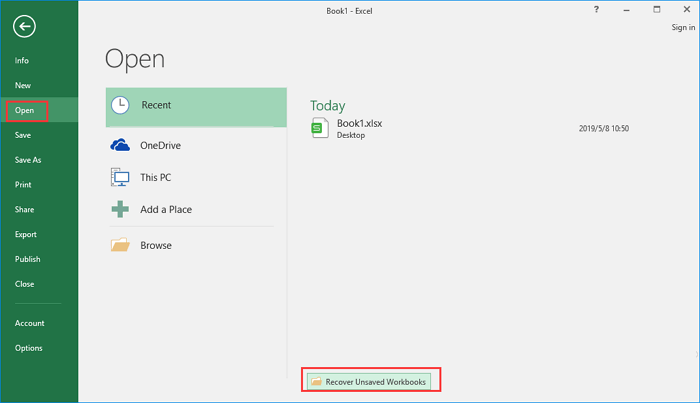
Step 2. Select the workbook you lost from the list. Then, open and save the Excel.
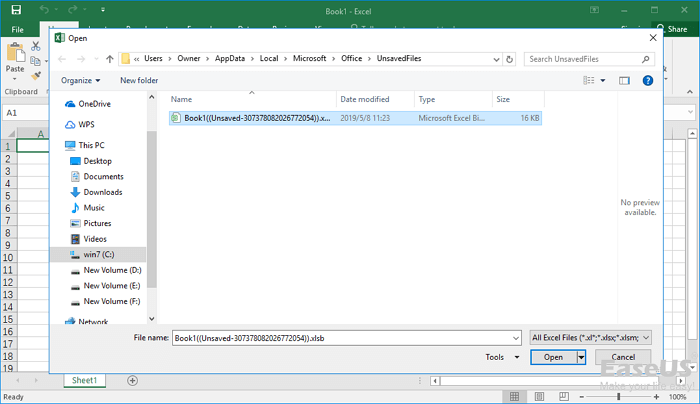
You see, if AutoSave is enabled in Excel, recovering unsaved data is very easy. But keep in mind, that Excel AutoSave or AutoRecover are not an alternative to manual saving. Save your work in real-time manually to prevent data loss.
How to Recover Deleted Excel Files in Windows 10 and Mac
Accidentally deleting Excel files happens frequently, which brings big trouble for many users. Don't panic. You can use Deep Data Recovery to recover deleted or lost Excel, Word, photos, videos, audio, emails, or other files without any effort.
This reputable data recovery and repair tool is also good are repairing corrupted Excel files efficiently. Free download this software and learn to get back permanently deleted Excel in three steps.
Step 1. Select file types and click "Next" to start
Launch Deep Data Recovery software. Select file types and click "Next" to start.

Step 2. Select location and click "Scan"
Choose the drive or a specific folder on Desktop or somewhere else where you lost the excel files, and click the "Scan" button.

Step 3. Locate your excel files
To quickly find the Excel files from the scan results, click the "Documents" option in the left panel. Choose "Excel", and click "Preview" to check if the Excel files are the wanted ones.

Step 4. Recover Excel files
Finally, select the desired Excel files and click the "Recover" button. Then, select a folder to save the Excel files to another location.
Addition Information About Excel AutoSave
When you are using AutoSave in Excel, you may meet the following issues. Let's check their methods together.
1. Why can't I turn on AutoSave in Excel?
AutoSave settings may don't work for some files, especially large files, or files stored on SharePoint. You can go to "File > Options > Save" and re-check the AutoSave box.
2. How to change AutoSave Location in Excel?
Usually, the AutoRecover file location path is C:\Users\Owner\AppData\Roaming\Microsoft\Excel. You can change the file location as you need in the ways below.
Step 1. Open Excel. Click the "File > Options" ( In Excel 2007, click the Office button > Excel Options).
Step 2. Click Save in the left bar and find "AutoRecover file location".
Step 3. Delete the default path and enter your location. Click "OK" to save the change.
3. How to disable AutoSave in Excel?
The way to turn off AutoSave is the same as the way to enable it. You can follow the steps of how to turn on AutoSave in Excel 2016 to find the AutoSave option, and then uncheck it.
Related Articles
- Fixed: Samsung SSD Not Showing Up in BIOS
- [Solved] Recover Data from Ext4/3/2 NAS/Linux Device
- How to Use Deep Data Recovery
- Run Deep Data Recovery from WinPE Bootable Disk